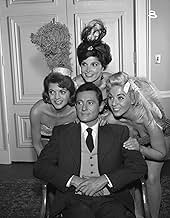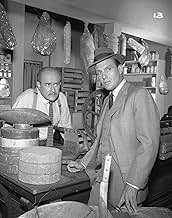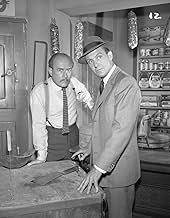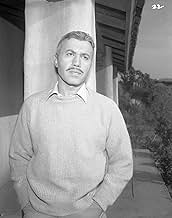CALIFICACIÓN DE IMDb
8.0/10
3.3 k
TU CALIFICACIÓN
El agente especial Eliot Ness y su equipo de élite de agentes luchan contra el crimen organizado en la década de 1930 en Chicago.El agente especial Eliot Ness y su equipo de élite de agentes luchan contra el crimen organizado en la década de 1930 en Chicago.El agente especial Eliot Ness y su equipo de élite de agentes luchan contra el crimen organizado en la década de 1930 en Chicago.
- Ganó 2 premios Primetime Emmy
- 4 premios ganados y 7 nominaciones en total
Explorar episodios
Opiniones destacadas
I use to watch the Untouchables every thursday nite, never missed a series ever. I still remember the comericals CHILDS double edge razor blades, Chesterfield cigarettes.
Every time I watch it from one of my VHS tapes I long for the series to come back on TV.
Bet you didn't know that a lot of the guest appeared on THE Adventures of SUPERMAN, also on LASSIE, and a few on GUN SMOKE. Which was no surprise sense THE UNTOUCHABLES was a Desilu Production.
To sum it up if you haven't seen THE UNTOUCHABLES the TV series of the 50's, You haven't lived until you do.I hope someday to have all of the series to watch.
Sencer Thanks James
Every time I watch it from one of my VHS tapes I long for the series to come back on TV.
Bet you didn't know that a lot of the guest appeared on THE Adventures of SUPERMAN, also on LASSIE, and a few on GUN SMOKE. Which was no surprise sense THE UNTOUCHABLES was a Desilu Production.
To sum it up if you haven't seen THE UNTOUCHABLES the TV series of the 50's, You haven't lived until you do.I hope someday to have all of the series to watch.
Sencer Thanks James
This show's concept was hastily developed to become a one-hour weekly dramatic series after the success of the beautifully produced made-for-television movie "The Scarface Mob". At first, the producers tried filming the capture of other important criminals using Eliot Ness, the TV-film's fictionalized real-life hero, as their central character. Then they designed a unit like the 1930s "Untouchables" squad depicted in the TV-movie, a federal group combating gang activity and other crimes in Chicago, one headed by Ness (Robert Stack) who worked out of an office in the city. He had six men, with Martin Flaherty (Jerry Paris), Jack Rossman, (Steve London), Enrico Rossi (Nicholas Georgiade), Lamarr Kane (Chuck Hicks) and William Youngfellow (Abel Fernandez) as its mainstays. In the second year, Paris left to be replaced by Lee Hobson (Paul Picerni) for the remainder of the series' run, and Cam Allison (Anthony George) was added for that year only. It was also decided that Frank Nitti (Bruce Gordon) and other mob bosses would be used as the main scheming villains without a regular "Al Capone" being portrayed. Nitti was killed off four times during the series, but Gordon was so popular with the show's watchers he was resurrected each time. A stable of regular police and ganglord types was also developed, played by Oscar Beregi, Joseph Ruskin, Frank Willcox, and Nehemiah Persoff with regular police and useful guest stars being hired a number of times. As Robert Stack had feared from the beginning, the show tended to marginalize the role of the ethical Ness in favor of unglamorously and dramatically portraying the activities of the victims, criminals, or crimelords of the week. The use of a narrator, radio commentator Walter Winchell, helped to keep the ethical view uppermost in observers' minds; and frequently, Ness and his squad were able to get across the desirability of cooperating with police, as this idea finally sank in. Outside agents played by John Gabriel, Jack Lord and others were sometimes used to improve a script. But from the first, the show's outstanding quality was the abilities of writers, directors and guest actors to produce powerful hour-long series. "The Petrone Story", "The Rusty Heller Story", "Cooker in the Sky", "Ginger Jake" and a hundred others may have occasionally overdone graphic detail and use of machine guns, but they were often brilliantly cinematic. The list of directors who toiled for the series included 29 first-raters including Ida Lupino, Tay Garnett, Vincent McEveety, Paul Wendkos, Richard Whorf, Walter Grauman and Bernard L. Kowalsi among others. The writers' list included 40 names, many illustrious, such as Robert C. Dennis, David P. Harmon, Ernest Kinoy, Harry Kronman, John Mantley, Gilbert Ralston, Sy Salkowutz, Alvin Sapinsley, George Slavin, William Templeton. Guest stars such as Patricia Neal, Elizabeth Montgomery, Lee Marvin, Arlene Martel, Will Kuluva, Dolores Dorn-Heft, Robert Middleton, Ruth Roman, Brian Keith, William Bendix, Barbara Stanwyck and Joe de Santis were always an extra cause to tune in to the latest adventure. In the last year, producer Quinn Martin bowed to pressure groups and tried to replace Italian surnamed villains with others; but the top-ranked series was canceled after 4 unforgettable years. To measure the quality of "The Untouchables" against most other series is impossible; its scenes have far more power than those of almost any other series; It was not always ethical fiction; but the series always had first-rate production qualities, acting, writing and directing. It holds a very high place in U.S. film history.
This was a one hour crime drama show shot in spartan black and white that lasted four seasons and supposedly followed the exploits of Elliott Ness (Robert Stack) and his Untouchables (unbribable) during their time in Chicago, 1931- 1933, although the details are very fictionalized.
It managed to stay interesting and creative by centering loosely on the criminal exploits of Al Capone and mainly Frank Nitti, played by Bruce Gordon throughout the series, but branching out to other Prohibition era criminals, often without the involvement of the Capone gang, and sometimes even without much mention of the Untouchables themselves. In fact, the Untouchables are often shown dealing with issues such as local murders that would be outside the purview of federal law enforcement and more in line with what the local police would have dealt with.
The guest stars are like a who's who of 1960s TV and even film - Elizabeth Montgomery, Lee Marvin, Cliff Robertson, Victor Buono, Rip Torn, Werner Klemperer, Brian Keith, etc. - as well as some veteran film stars such as William Bendix, Barbara Stanwyck, and J. Carroll Naish.
The show is episodic, skipping around in time, and it is interesting that with all of the talk of bringing criminals to justice that Ness ends up shooting it out with and ultimately killing almost all of the criminals at the end of the show. Either that or rival criminals ended up killing each other. The Department of Justice couldn't have been happy about that.
Ness died shortly before this series began, and it is ironic that the best days of his career were during his time with the Untouchables. Afterwards his life went on a downwards trajectory and included a couple of divorces, a failed election campaign for mayor of Cleveland, and failed business ventures. His time with the Untouchables largely forgotten by his death, this TV show resurrected interest in that period of history and thus that period of Ness' life.
It managed to stay interesting and creative by centering loosely on the criminal exploits of Al Capone and mainly Frank Nitti, played by Bruce Gordon throughout the series, but branching out to other Prohibition era criminals, often without the involvement of the Capone gang, and sometimes even without much mention of the Untouchables themselves. In fact, the Untouchables are often shown dealing with issues such as local murders that would be outside the purview of federal law enforcement and more in line with what the local police would have dealt with.
The guest stars are like a who's who of 1960s TV and even film - Elizabeth Montgomery, Lee Marvin, Cliff Robertson, Victor Buono, Rip Torn, Werner Klemperer, Brian Keith, etc. - as well as some veteran film stars such as William Bendix, Barbara Stanwyck, and J. Carroll Naish.
The show is episodic, skipping around in time, and it is interesting that with all of the talk of bringing criminals to justice that Ness ends up shooting it out with and ultimately killing almost all of the criminals at the end of the show. Either that or rival criminals ended up killing each other. The Department of Justice couldn't have been happy about that.
Ness died shortly before this series began, and it is ironic that the best days of his career were during his time with the Untouchables. Afterwards his life went on a downwards trajectory and included a couple of divorces, a failed election campaign for mayor of Cleveland, and failed business ventures. His time with the Untouchables largely forgotten by his death, this TV show resurrected interest in that period of history and thus that period of Ness' life.
Quinn Martin, Desilu and Robert Stack propelled a crime series into the status of TV greatness. This series ran 114 episodes long, but stands shoulder to shoulder with such giants as GUNSMOKE and BONANZA. Set in Chicago, late 20s and 30s during depressed times and prohibition, Special Treasury Agent Elliot Ness(Robert Stack)and his band of crime fighters must deal with bootleggers, gangland murderers, assassins and crime figures like Al Capone(Neville Brand) and Frank Nitti(Bruce Gordon). Expertly narrated by Walter Winchell, this power packed crime drama got the story told without the use of on screen gore, profanity or blatant violence.
Besides the super work by Stack and Gordon others became familiar faces:Nicholas Georgiade, Oscar Beregi Jr., Anthony George, Abel Fernandez, Jerry Paris, Steve London, Grant Richards and Jason Wingreen. This series was so near perfection production wise. Awesome.
Note: TV Land, A & E, Nick at Nite, TNN...somebody put this back on the air for future generations.
Besides the super work by Stack and Gordon others became familiar faces:Nicholas Georgiade, Oscar Beregi Jr., Anthony George, Abel Fernandez, Jerry Paris, Steve London, Grant Richards and Jason Wingreen. This series was so near perfection production wise. Awesome.
Note: TV Land, A & E, Nick at Nite, TNN...somebody put this back on the air for future generations.
I had never heard of "The Untouchables" TV show until one morning
my 8th grade English teacher, Mr. Schmidt started ranting about the
graphic violence depicted in movies and on television shows such as
"The Untouchables" and what was he world coming to? From the next
broadcast, I was an avid fan. Much as in the style of the James Cagney
classic of 1933, "Public Enemy," "The Untouchables" wove a web of
mysterious gangland horror by NOT showing the graphic violence but by
instead keeping the killing in the shadows. The creators of the series
never forgot that there is nothing you can show in theater that can
measure up to the imagination of the audience. Another mysterious dimension to the series is, like "The Alfred
Hitchcock Show", "The Untouchables" had an uncanny knack of featuring
actors who would later become stars or at least very well known faces
in movies and on television. After 4 years in the air force including
a year in Vietnam, I watched the series as daily re-runs during the
summer of 1971 just before going to university in Tokyo. One episode
had Telly Savalas as an up and coming bookkeeper with The Mob run by
Frank Nitty while Al Capone was in prison. That evening other business
pulled me away from the television set and I figured I'd see the second
half of the show some other time. Because I have been in Japan ever
since, I never did find out whatever happened to the character played
by Telly Savalas. Less than two years later, however, Telly Savalas
finally made it big in television as Kojak.
my 8th grade English teacher, Mr. Schmidt started ranting about the
graphic violence depicted in movies and on television shows such as
"The Untouchables" and what was he world coming to? From the next
broadcast, I was an avid fan. Much as in the style of the James Cagney
classic of 1933, "Public Enemy," "The Untouchables" wove a web of
mysterious gangland horror by NOT showing the graphic violence but by
instead keeping the killing in the shadows. The creators of the series
never forgot that there is nothing you can show in theater that can
measure up to the imagination of the audience. Another mysterious dimension to the series is, like "The Alfred
Hitchcock Show", "The Untouchables" had an uncanny knack of featuring
actors who would later become stars or at least very well known faces
in movies and on television. After 4 years in the air force including
a year in Vietnam, I watched the series as daily re-runs during the
summer of 1971 just before going to university in Tokyo. One episode
had Telly Savalas as an up and coming bookkeeper with The Mob run by
Frank Nitty while Al Capone was in prison. That evening other business
pulled me away from the television set and I figured I'd see the second
half of the show some other time. Because I have been in Japan ever
since, I never did find out whatever happened to the character played
by Telly Savalas. Less than two years later, however, Telly Savalas
finally made it big in television as Kojak.
¿Sabías que…?
- TriviaWalter Winchell received a reported $25,000 per episode for his narration on this series. With his signature machine gun dialogue delivery, he could apparently rack up almost 200 words per minute.
- ErroresThe opening credits for the fourth season show a book open to a page that reads "The Untouchables, 1929--1933". This contradicts the chronology of several episodes set in 1934 or 1935.
- Citas
Police Officer: There is nothing in that area... except an old abandoned warehouse.
- ConexionesEdited into The Scarface Mob (1959)
Selecciones populares
Inicia sesión para calificar y agrega a la lista de videos para obtener recomendaciones personalizadas
- How many seasons does The Untouchables have?Con tecnología de Alexa
Detalles
- Fecha de lanzamiento
- País de origen
- Idioma
- También se conoce como
- The Untouchables
- Locaciones de filmación
- Productoras
- Ver más créditos de la compañía en IMDbPro
- Tiempo de ejecución50 minutos
- Color
- Mezcla de sonido
- Relación de aspecto
- 4:3
Contribuir a esta página
Sugiere una edición o agrega el contenido que falta

Principales brechas de datos
By what name was Los intocables (1959) officially released in India in English?
Responda






































